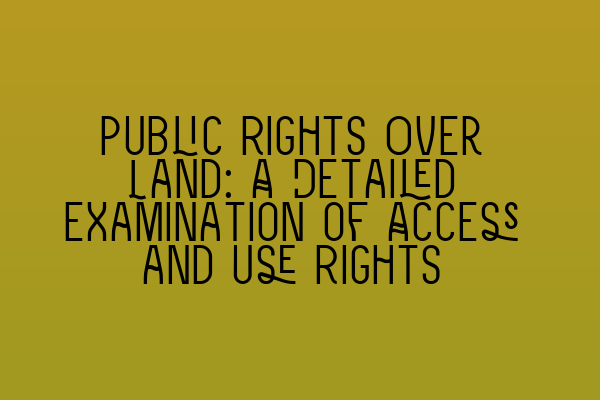Public Rights Over Land: A Detailed Examination of Access and Use Rights
As a property owner or potential property owner, it is essential to have a clear understanding of the public rights that may exist over land. Public rights over land refer to the legal entitlements of individuals or the general public to access and use certain areas of land. These rights can have significant implications for property owners, developers, and land users. In this blog post, we will dive into the intricacies of public rights over land, exploring access rights and use rights in detail.
Access Rights
Access rights pertain to the public’s right to physically access certain areas of land. These rights can be significant, especially if they grant public access to private property or restrict an owner’s control over their land. Access rights commonly arise in the following forms:
1. Rights of Way: Rights of way refer to the legal right for individuals to pass through or cross over a specific area of land. They can be footpaths, bridleways, or private roads that allow public access. Rights of way can be documented in legal agreements, historical usage, or through established public highways.
2. Easements: Easements are legal rights that allow one party to use a specific portion of another party’s land for a specific purpose. Easements can be for various purposes, such as accessing utilities, drainage, or rights to light. The precise nature and extent of an easement are typically defined in legal agreements, and they can be either public or private.
3. Coastal Access: In coastal areas, there may be public rights to access beaches, foreshores, or other coastal areas. These rights are usually subject to regulations and may be designated by local authorities or government bodies.
Understanding the extent and nature of access rights is crucial for property owners and developers to avoid any legal disputes or unintended public access to their land. It is essential to consult with a property law expert to ensure compliance with regulations and to protect your rights as a landowner.
Use Rights
Use rights refer to the ability of the public to use land for specific purposes beyond mere access. These rights can impact landowners and may limit certain activities or development potential. Some common use rights include:
1. Public Parks and Spaces: Certain areas of land may be designated as public parks or open spaces, allowing the general public to use them for recreational purposes. These spaces are typically maintained by local authorities or government bodies and may have specific restrictions or regulations in place.
2. Conservation Areas and Nature Reserves: Unique natural habitats and environmentally significant areas may be protected by law, limiting landowners’ ability to develop or alter them. These areas often have stringent regulations regarding development and may require permits or approvals.
3. Public Rights to Fishing and Hunting: In some cases, members of the public may have the right to fish or hunt on certain privately-owned land. These rights are typically subject to specific regulations, licenses, or permits.
Understanding the use rights that might exist over your land is crucial when planning any development or changes to the property. Failure to comply with relevant regulations can have significant legal consequences and result in fines or other penalties.
Conclusion
Public rights over land are a complex legal subject that requires careful consideration by property owners, developers, and land users. Access rights and use rights can have a substantial impact on property rights, development potential, and land usage. It is crucial to seek legal advice and consult with property law experts to ensure compliance with regulations and protect your rights as a landowner.
If you would like to learn more about property law and land law topics, we offer SQE 1 and SQE 2 preparation courses to help you prepare for your professional qualifications. You can also access our SQE 1 practice exam questions and practice mocks to enhance your knowledge and test your understanding. Stay updated on the latest SRA SQE exam dates to plan your studies effectively.
Contact SQE Property Law & Land Law today for expert legal advice and assistance in navigating the complexities of public rights over land.
